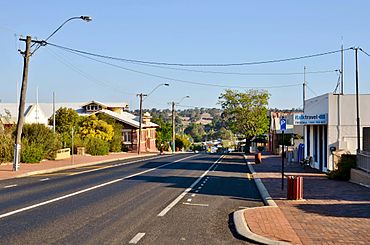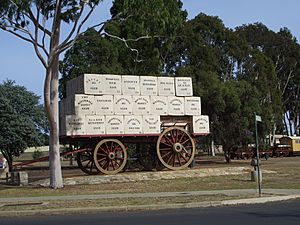Kojonup, Western Australia facts for kids
Quick facts for kids KojonupWestern Australia |
|||||||||||||||
|---|---|---|---|---|---|---|---|---|---|---|---|---|---|---|---|

Albany Highway, Kojonup, 2018
|
|||||||||||||||
| Established | 1845 | ||||||||||||||
| Postcode(s) | 6395 | ||||||||||||||
| Elevation | 305 m (1,001 ft) | ||||||||||||||
| Area | [convert: needs a number] | ||||||||||||||
| Location | |||||||||||||||
| LGA(s) | Shire of Kojonup | ||||||||||||||
| State electorate(s) | Roe | ||||||||||||||
| Federal Division(s) | O'Connor | ||||||||||||||
|
|||||||||||||||
|
|||||||||||||||
Kojonup is a town located about 256 kilometres (159 mi) south-east of Perth, Western Australia. It sits along the Albany Highway in the Great Southern region. The name Kojonup comes from "Kodja", which is a stone axe made by Aboriginal Australians from local stone.
Contents
Discovering Kojonup's Past
Early History and Noongar People
The Noongar people are the original owners and residents of Kojonup. Today's Noongar people in Kojonup are descendants of the Kaneang language group. They also have ties to nearby groups like the Koreng, Pinjareb, and Menang people.
Historically, the Noongar people used to drink from a local freshwater spring. They hunted animals using their traditional "kodj" or stone axe. Both the town Kojonup and a local place called The Kodja Place are named after this important tool.
European Settlement and Development
The first European to visit the area was a surveyor named Alfred Hillman in 1837. Noongar people guided him to the freshwater spring. This spot became a key stopping point on the road to Albany.
In 1837, a military post was set up here. Its job was to protect travelers and mail. By 1845, this outpost had grown. A military barracks was built right where the freshwater spring was.
Kojonup Barracks: A Historic Building
Today, the barracks still stands in its original spot. It now houses the Kojonup Historical Society Pioneer Museum. This building is one of the oldest in Western Australia.
The first farms in Kojonup were started by soldiers. They received land grants to settle there. By 1865, a mounted police officer took over from the military. The military left completely by the late 1860s. The barracks then became a place for community gatherings, just as it is today. The town's first police station was built in 1869. The first hotel opened in 1868.
Connecting Kojonup by Rail
The Katanning-Kojonup railway line was a big step for the town. It was part of the Donnybrook–Katanning railway. This railway officially opened on April 10, 1907.
In 1926, the Kojonup Memorial Hall was built. It cost £5,000 to build. Major General Sir Talbot Hobbs officially opened it.
Kojonup has been home to many important Australian rules football players. This includes several players of Indigenous Australian background.
Kojonup's Economy: Farming and More
The town's economy first relied on cutting and moving sandalwood. People also hunted kangaroo. But by the mid-1800s, the wool industry became very important. By 1906, the area had 10,500 sheep. By 1989, over 1 million sheep were being shorn in the region!
To celebrate the importance of the wool industry, the town built a huge model. It's a one-and-a-half scale model of a wool wagon. This impressive project was officially opened on Australia Day in 2001.
The farms around Kojonup grow wheat and other cereal crops. These include organic, regular, and genetically modified crops.
The Kojonup area has been a leader in biodynamic and organic agriculture. There was even a famous legal case, Marsh v Baxter, about organic versus genetically modified farming. The town is also a receival site for Cooperative Bulk Handling. This means it's a place where farmers can deliver their grain.
Fun and Activities in Kojonup
Kojonup offers many ways to have fun and stay active.
Sporting Facilities
- A golf club with 18 holes for playing golf.
- A tennis club for tennis fans.
- A skate park for skateboarding and scootering.
- A 50-metre (160 ft) outdoor swimming pool for cooling off.
- A football oval, netball courts, and hockey ovals for team sports.
Other Attractions
- The Kodja Place: This is a special place where you can learn about the Noongar history of Kojonup. A local elder, Billy Riley, gives tours here.
- Kojonup Youth Centre: A place for young people to gather.
- Rose Maze: A beautiful maze made of roses.
The Jack Cox courtyard at The Kodja Place is named after Jack Cox. He was the first Noongar guide at Kodja Place.
Notable People from Kojonup
Kojonup has been home to some well-known people, especially in sports.
- Peter Bell: An Australian rules football player. He is a member of the Australian Football Hall of Fame.
- Shannon Cox: Another Australian rules football player.
- Stephen Michael: Also an Australian rules football player and a member of the Australian Football Hall of Fame.
- Brigadier Arnold William Potts: An Australian farmer who served bravely in both World Wars. He received several awards for his service.
Kojonup's Climate
| Climate data for Kojonup | |||||||||||||
|---|---|---|---|---|---|---|---|---|---|---|---|---|---|
| Month | Jan | Feb | Mar | Apr | May | Jun | Jul | Aug | Sep | Oct | Nov | Dec | Year |
| Record high °C (°F) | 44.2 (111.6) |
43.2 (109.8) |
38.6 (101.5) |
36.1 (97.0) |
32.2 (90.0) |
22.8 (73.0) |
21.5 (70.7) |
24.6 (76.3) |
27.4 (81.3) |
33.2 (91.8) |
38.8 (101.8) |
40.1 (104.2) |
44.2 (111.6) |
| Mean daily maximum °C (°F) | 29.5 (85.1) |
28.8 (83.8) |
26.1 (79.0) |
22.2 (72.0) |
18.1 (64.6) |
15.1 (59.2) |
14.4 (57.9) |
14.9 (58.8) |
16.8 (62.2) |
20.1 (68.2) |
23.5 (74.3) |
27.7 (81.9) |
21.4 (70.5) |
| Mean daily minimum °C (°F) | 13.1 (55.6) |
13.7 (56.7) |
12.6 (54.7) |
10.6 (51.1) |
8.1 (46.6) |
6.7 (44.1) |
5.9 (42.6) |
5.8 (42.4) |
6.2 (43.2) |
6.2 (43.2) |
9.7 (49.5) |
11.8 (53.2) |
9.3 (48.7) |
| Record low °C (°F) | 4.0 (39.2) |
3.9 (39.0) |
2.4 (36.3) |
2.2 (36.0) |
−3.5 (25.7) |
−2.5 (27.5) |
−2.6 (27.3) |
−1.4 (29.5) |
−1.0 (30.2) |
−0.2 (31.6) |
0.0 (32.0) |
2.8 (37.0) |
−3.5 (25.7) |
| Average precipitation mm (inches) | 13.9 (0.55) |
13.9 (0.55) |
22.0 (0.87) |
32.3 (1.27) |
66.6 (2.62) |
87.1 (3.43) |
86.5 (3.41) |
74.0 (2.91) |
52.7 (2.07) |
39.8 (1.57) |
24.1 (0.95) |
15.2 (0.60) |
527.3 (20.76) |
| Average precipitation days | 3.4 | 3.2 | 4.6 | 7.7 | 13.4 | 16.7 | 18.1 | 17.0 | 14.2 | 11.0 | 6.8 | 4.0 | 120.1 |
| Average afternoon relative humidity (%) | 37 | 41 | 42 | 50 | 62 | 72 | 72 | 70 | 63 | 57 | 48 | 41 | 55 |
 | John T. Biggers |
 | Thomas Blackshear |
 | Mark Bradford |
 | Beverly Buchanan |



